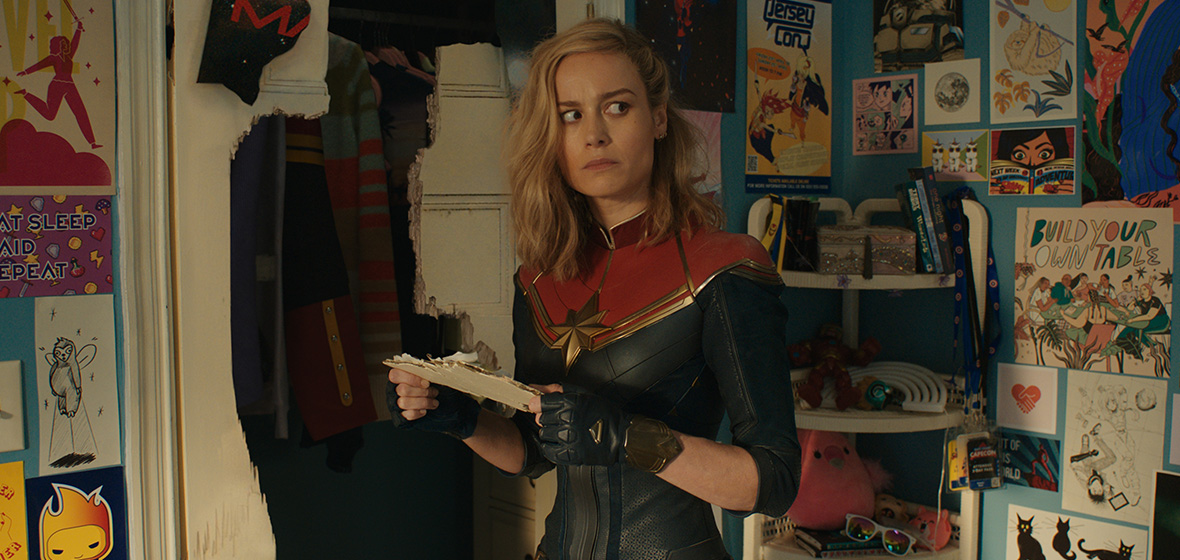Halfway through The Marvels, our heroes arrive at a planet where people communicate through singing. It is an inspiring moment of sandbox wonder; even the art direction in that planet tries to be as far removed from any recognisable trait. It looks uncomfortably alien but also fun. Everyone sings and dances, there’s colour everywhere, and for a moment there I’m enjoying a Marvel Cinematic Universe film as a standalone experience. Unfortunately, this is a fleeting feeling, and the scene on this planet falls short of meeting its potential before devolving into, yet again, a generic brawl between superbeings. Yawn.
There are other highlights in The Marvels that elevate it to one of the best MCU films since that last bloated Avengers. It may feel like a chore to even catch up on this story – The Marvels positions itself not only as a sequel to Captain Marvel but also three of those direct-to-stream TV series, but fortunately, it does an excellent job at putting those who didn’t bother with the backstory up-to-date. The story is the simple “villain is looking for an artifact that will destroy the planet”, enhanced by an exciting idea – because of a space-time anomaly, the powers of Captain Marvel (Brie Larson), Ms Marvel (Iman Vellani), and Captain Monica Rambeau (Teyonah Paris) get entangled.
When they use their powers simultaneously, they switch places regardless of what action they’re doing. The film kickstarts its plot right away with the three characters, who don’t know each other, confusingly fighting cronies in three different parts of the universe before they even understand what is going on. It’s a terrific idea that director Nia Da Costa stages with so much amusement before reeling it down to the drab reality of the “standard MCU affair”.
Da Costa brings light to the concept and the characters. First, she scraps Captain Marvel’s pro-military and American exceptionalism subtext for a story that celebrates diversity and harmony. She gives Larson the personality her character lacked in the previous films, letting her relax and enjoy the ride instead of pretending she has the universe’s weight on her shoulders. At the same time, she gives her hubris by facing the responsibility of the destructiveness of her powers. Da Costa understands the genre she’s working on and cares more about it than the business or the brand. It’s precisely when the Marvel shadows lurk over the plot that the film starts losing its steam and interest.
Doing the best she can to rebalance, Da Costa uses every chance to sprinkle some anarchy as much as she can – the concept of the beginning, the musical planet. Later, there’s a moment so deliciously bizarre words won’t do it justice. But every one of those ideas is held back by the constraints of the brand and, if anything, indicates the most prominent problem behind this behemoth of a saga trying to control all pop culture. The Marvels shows the effect the MCU has on artistic freedom is negative. If anything, the film shows that Kevin Feige, the mastermind of this whole affair, had in Da Costa a breath of fresh air like he did with James Gunn (from Guardians of the Galaxy, arguably the best the MCU has to offer), but didn’t have the foresight to let her do whatever she wanted to do.
The result is the most playful and harmless MCU film yet. And maybe our expectations are so low that something like The Marvels is enough to charm us, but where the genre fails, this one has the euphoria of a good Saturday morning cartoon. And that’s more poignant than anything they’ve done in a long time.
Verdict: 3 out of 5
For a day of old-school entertainment with the playfulness and inspiration of a child on a sugar rush.




